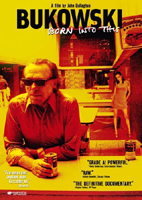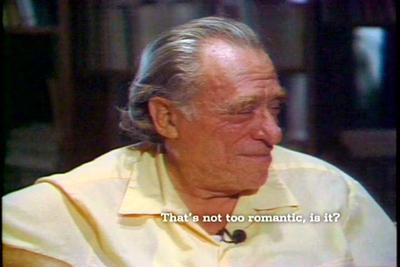 BUY IT AT AMAZON: CLICK HERE!
BUY IT AT AMAZON: CLICK HERE!
STUDIO: Magnolia
MSRP: $26.98
RATED: R
RUNNING TIME: 113 Minutes
SPECIAL FEATURES:
• Director commentary
• Peek at previously unpublished poems
• Behind-the-scenes featurette
• Bukowski’s home footage from 1992
• Deleted scene
• Extended interviews
• Tom Waits and Bono read Bukowski
The Pitch
"The
life and times of Charles ‘Hank’ Bukowski, who’s like Wordsworth meets Hunter
S. Thompson in a bar fight, with worse skin."
The Humans
Henry
Charles Bukowski Jr, and his small galaxy of admirers, including his last wife,
Linda Lee Bukowski, U2’s frontman Bono, Tom Waits, Sean Penn as Lighthearted
Sean Penn, and publisher John Martin.
The Nutshell
Charles
Bukowski was a prolific poet and novelist, most productive during the sixties
and seventies. But if, when you hear "poet," you think of sensitive,
introspective men and women, you’re going to have to create a new
classification in your brain. Bukowski was a controversial literary figure,
with a complicated past and a life that did little to untangle those
complications. This documentary is about his life and his work, with no agenda
other than to humanize a man who carefully cultivated his own demonic persona.

Shortly after this shot, Bukowski prodded the camera gently with a twig,
then ate the lenscap.
The Lowdown
I don’t
think I converted many to my love of poetry with my review of Dead
Poets Society (here), so here’s another stab. Tired of poetry about clouds of
glory, albatrosses, and Don Juan? Bored of jazz June, and
Kenyon? Try a little Bukowski. Here’s a poet that won’t make you look like a
pussy. He was a poet of the people, at a time when the people were crying out
against constrictive decency regulations, academic authority, and pointless
wars. He was also a fair shade Hellwards of being a bastard, which, of course,
makes him perfect fodder for a biographical documentary.
Director
John Dullaghan has assembled a wealth of information on the writer, both new
and old. Cut in with new interviews of people reminiscing about Bukowski’s life
are sequences of rough footage from a proposed 1972 documentary, and interviews
with international newsmedia pulled out of the archives. The film follows a
roughly chronological path of Bukowski’s life, starting with his difficult
childhood, moving through his early unsuccessful years as a writer, and
finishing right up at the man’s death.
Biographical
documentaries are different animals from those with a thesis, because rather
than following a director’s authorial guidance they rely almost entirely on
interest generated by the study. Fortunately, Bukowski was an interesting
character, and he gets plenty of time to speak for himself. One of the
fascinating things about him is that he seems to exemplify the observation that
all writers are liars. In several of the filmed interviews, personal questions
are asked of him, and he’s always ready with some story or other — but the
specifics of the story feel too fabricated, too arranged to be true. If they’re
true, then they reveal a bit of direct emotion that was mainly well-hidden from
the public eye; if they’re lies, then they intrigue the audience, and make us
wonder what emotion he was then trying to hide.

…unfortunately, he could only read them if a friend
held them up to his right shoulder.
As with
so many poets, emotion is at the core of both Bukowski’s life and art. He was,
essentially, a romantic, in that he was concerned with the experience of humans
and the exchange of emotions. The topics he chose to write on were abuse,
misanthropy, sexual dissatisfaction, idle boasts, depravity, bleakness, and
apathy, but there is an idealism to his work that dwells in the opposites. He
didn’t have much time for metaphors or simile; he wrote directly, in the voice
of a man without pretension, in that division of poetry that feels more like
emotion bled onto the page, instead of recalled in tranquility. He wrote with
an agenda: to speak his mind, whatever space it happened to occupy.
The love
of tension extended beyond his depressing/idealistic writing, though. He was an
alcoholic, and claimed he couldn’t write without a good drink by him. He spread
to other vices, as well, and one of the interviews has him observing, wryly,
that he "can’t write without the track," where he would frequently
bet on horses before turning to his typewriter.

No, baby, tell me again how my face is like a puddle of swallow’s vomit.
All the
above stands as my assertion that the man is well worthy of the biography
treatment, and, really, the documentary film is a perfect medium to tell his
story in. His gruff voice, sullen demeanor, and wicked humor are evident in his
prose and poetry, but paired with his image and deliberate movements his
"common man" persona becomes even more clear. Bukowski has been
somewhat elevated into the halls of assholism by popular opinion and retconning
of 20th century literature, so it’s not only nice but valuable to see this alternative take on the accomplishments of his
life.
John
Dullaghan’s work here probably won’t appeal to anyone who is disinterested in
Bukowski, but it’s a moody, well-paced shading of a man who has lingered in
two-dimensions for too long in the common awareness. Afterwards, you may not
like the man, but it’s hard not to be glad that he existed.

You should see the issue in which Bukowski knifes Batman
for being a neo-formalist.
The Package
Magnolia
have been doing some fine work with their releases lately, and this is no
exception. Though much of the source material is restored from stock that was
outdated in the sixties, there are rarely issues of clarity in the sound or the
image. The older footage is obviously crummy black-and-white, but it serves its
purpose, and the speech, though occasionally drowned out, is never completely
obliterated.
I can’t
report on the bonuses, sadly, as CHUD was sent only a screener disc containing
none of the extra features. What seems to be available on the retail discs is a
nice representation, including: director commentary, peeks at unpublished
Bukowski works, readings by Bono and Tom Waits, a behind-the-scenes featurette,
a deleted scene, and extended interviews. I can’t vouch for any of the quality,
but it’s a good showing.
8.1 out of 10